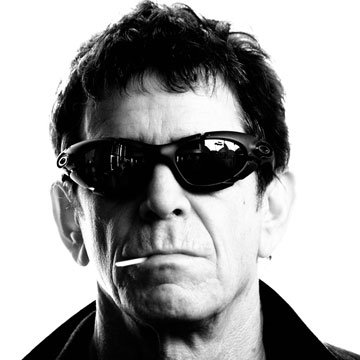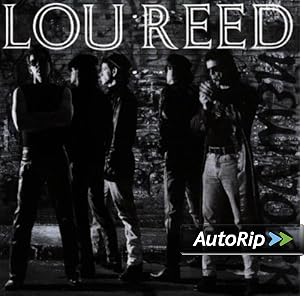I've always found it hilarious that, while I can take or leave Lou Reed (except "Walk on the Wild Side" - EVERYBODY loves that song), I believe the first album (cassette, really) I bought with my own money was his 1989 New York album.
Which, now that I type that, makes it absolutely impossible that it was the first album I bought. It was my Senior year of high school. By that point, I'd been heavily into The Beatles, and had sought out that entire catalog, at the very least. I guess I should look at it as my first "what the hell is this?" purchase. Funny how the mind makes that into a much larger deal.
Lou Reed was not mainstream, no matter how often classic rock radio plays "Walk on the Wild Side." He lived in a shadowy world that was near the mainstream, but refused to play to it's rules. Obscure and challenging seemed to be built into the man's DNA. I was always sort of flabbergasted by the mainstream critical reaction to Lulu, for example, because it really does feel part-and-parcel of the Reed catalog. It's obscure, only flirts with melody, and generally challenging to the listener. The metal community was never going to get it, that was a given, determined to judge it as a Metallica album, when it was absolutely not.
But I digress.
After hearing of Reed's passing, I flashed immediately to the point where I could honestly say I LOVED the man's music, and that was New York.
Honestly, I'm not enough of a scholar of Reed's work to really put the album into any sort of
perspective, but I can describe the experience I had with it. The memory I have is being on some sort of trip with my parents, one of those long road trips where were were going somewhere, and the destination seemed to never get any closer. It just felt like unending hours in an uncomfortable back seat of a car (I had hit 6'3" by the time), with small towns a farmland going by.
But I had my Walkman, and a few tapes. I had New York, and I found myself listening to it over and over again. I was particularly taken with track 3, "Dirty Blvd," but the whole album, with it's dour sense of America and rampant pessimism, was compelling in ways that were brand new to me. Music was about melody and catchy hooks, for me. Still is, honestly, but Reed, with his almost-monotone delivery, evoked something that other music had not. Something that felt utterly unpolished, and utterly real. He was evoking his New York, and it was pretty alien to a kid from Colorado.
Plus, he swore a lot. That was cool, and it didn't feel like shock tactic, like the rap and hair metal bands were doing. This felt like a glimpse into Reed's world, where saying, "stick a fork in their ass and turn 'em over, they're done" was just how one expressed themselves. It was poetry, and I think my immediate and unceasing love for David Mamet probably had it's seeds there, as well.
It was also probably the first overtly political album I owned. With pointed comments about "the statue of bigotry," the plight of Native Americans and the natural world. The Beatles dealt in hopes, "all you need is love," Reed talked about the way things really were, and how frightfully shitty that is.
No, I can't say that I'm a "Lou Reed fan," but I am a fan of New York, and it opened music up, for me, in a big way.


No comments:
Post a Comment